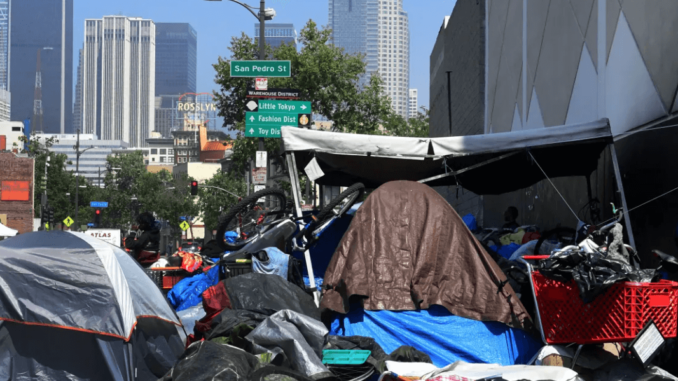
A massive cleanup is underway in the most populous county of the U.S. Los Angeles County, home to 9.8 million residents, is receiving help from the federal government with cleaning up notorious homeless encampments.
The Southern California area houses 88 cities, including Los Angeles, Long Beach, Glendale, Pasadena, Santa Clarita, Lancaster, and smaller but well-known areas, Malibu, Calabasas, Beverly Hills, Burbank, Inglewood, and Compton.
One of the first places to be addressed was the infamous Skid Row, where people would create encampments outside of homeless shelters, small businesses, and religious institutions on either side of San Pedro Street in Downtown Los Angeles.
In 2021, Federal Judge David O’Carter ordered that transients on Skid Row be offered housing by the City of Los Angeles and Los Angeles County no later than October 2021. Despite increased funding to supplement the cleanup campaign, it wasn’t until early February 2023 that a task force of police officers and county sanitation workers made a visual effort to clear the area.
The encampments have incurred many issues, including an increase in drug and sex trafficking, violence, and trash pollution. While neighboring residents and businesses are grateful for the attention that Los Angeles County is now giving to homelessness, there is another segment of people, mainly homeless activists, that are fighting for people to have the right to camp anywhere on the streets.
Homeless activist Stephanie Arnold worked an entire decade to build her encampment on Skid Row. Her tiny house included a hot tub and full operating kitchen. On Feb. 13, Arnold’s makeshift home was torn down by a Los Angeles County commissioned crew under the mandate of a routine cleanup. A caution tape divided the homeless from their encampments, causing the large group to protest.
An investigative report by Fox 11 Los Angeles exposed the homeless encampments of the six-mile area bordered by Harbor Gateway and an unincorporated area of Los Angeles County.
Within the sector lies over 550 RVs, some non-operational, parked alongside the polluted streets. Within a matter of days, a Los Angeles County cleanup crew begin towing away abandoned RVs, clearing waste-ridden storm drains, and picking up trash.
The cleanup efforts come on the cusp of the County declaring a local emergency on homelessness. Los Angeles County’s Board of Supervisors approved a $609.7 million budget to be used for the next two years.
The budget is intended to provide interim and permanent shelter for those displaced by cleanup efforts, to fund mental health and substance abuse initiatives for homeless people, and to clear out homeless encampments.
A Winter Shelter Program is held annually to protect people experiencing homelessness during Los Angeles’s colder months. Winter Shelters are located all across the County, and will be operating 24 hours a day due to COVID‑19. For more information, please call the Winter Shelter Hotline at 1(800) 548-6047.



